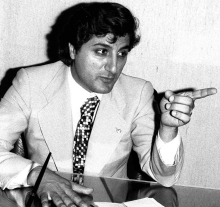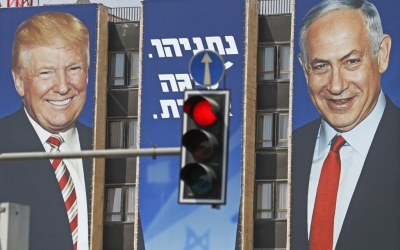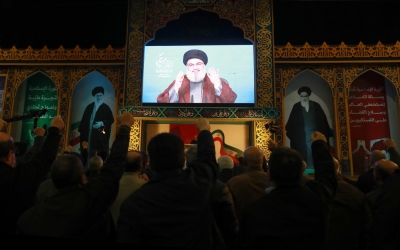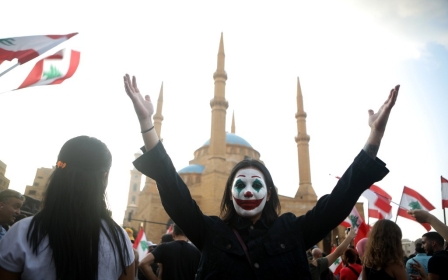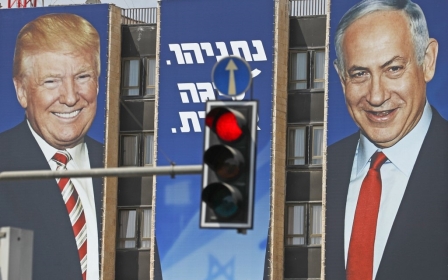All eyes on Hezbollah: How Israel is watching the protests in Lebanon
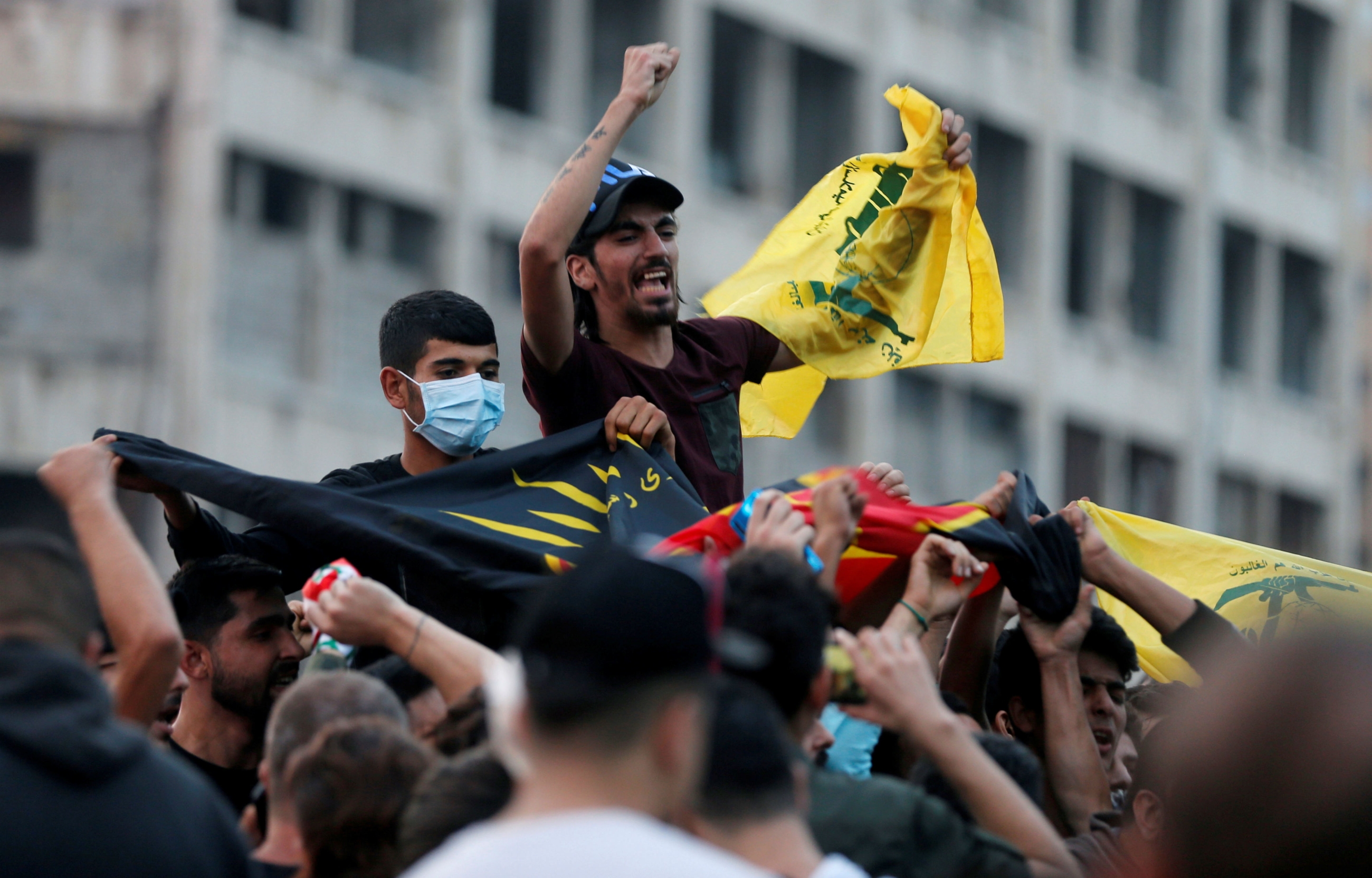
Israeli analysts have a knack for getting Lebanon wrong, and the past three weeks of popular unrest next door have taken Israel by surprise once again.
Yet even as the civil disobedience has caught experts off guard, Israel - which views Lebanon above all as the land of Hezbollah - stands to gain or lose in large measure, all depending on the outcome for the powerful Iranian-backed movement.
Over the years, Israel's perception of its northern neighbour - an enemy state since 1948 - has been shaped by its bitter experience, including several Israeli army invasions, particularly in 1982 and 2006, and its 18-year military occupation there.
The prevailing assumption among Israeli experts, mainly those inside the country's intelligence agencies, has been that Lebanon is too heavily divided between religious and ethnic groups to unite and rally around common interests or ideas.
New MEE newsletter: Jerusalem Dispatch
Sign up to get the latest insights and analysis on Israel-Palestine, alongside Turkey Unpacked and other MEE newsletters
And Israel has sought to take advantage of these sectarian rifts. It invaded Lebanon in 1982 supposedly to crush the Palestine Liberation Organisation (PLO) and push it back from the border. Having done that, it sought to crown its ally Bashir Gemayel, the head of a powerful right-wing Christian militia, as the country's president.
Just when Israel thought it had its man in power, things went awry. Gemayal had agreed to start discussing diplomatic ties with Israel, but was assassinated right before he was set to be sworn in as president.
In the mire of Israel's occupation of south Lebanon that followed, Hezbollah, with the help of Iran, emerged as the dominant Shia force in the country and waged a deadly insurrection that blighted Israel for years to come.
Getting it wrong
Nowadays, Israel is beginning to realise its small-mindedness when it came to assessing Lebanon. The cross-sectarian and broadly inclusive protest movement that has rumbled on since 17 October shows quite clearly that the Lebanese share several common goals and ideals.
The misconception of Israeli intelligence analysts and even independent academic experts is reminiscent of their past failures in Iran and the Arab world.
In 1977-79, they couldn't conceive of street protests against the Shah leading to the Iranian revolution. Thirty years later, they still didn’t understand the power of the masses and the deep social, political and cultural tectonic movement which eventually led to the 2011 Arab uprisings.
Here is just one example to illustrate this point: Guy Bechor, an Israeli analyst on Middle East affairs who is popular with the right, assured the Israeli public that despite widespread protests, Egyptian President Hosni Mubarak would remain in power as he had for nearly 30 years. Two days later, he was toppled.
Scenario one: Weakened Hezbollah
In Israeli eyes, events in Lebanon can lead to two completely contradictory results, like a junction with two roads - and it’s hard to predict which way the country will go.
One road will see the weakening of the country's traditional established political forces, including Hezbollah, a shift which would benefit Israeli interests.
'Intelligence sources tell me that General Qassem Soleimani advised Nasrallah to be more aggressive and quash the protest'
Hezbollah is not only Israel's bitter enemy and considered by Israel to be Iran’s advance post along the Mediterranean, but critically it is also a movement which perceives itself to be rooted in Lebanon.
It has been part of the government for more than decade. It has a strong parliamentary faction and has penetrated the Lebanese army, its security services, economy and all other major parts of Lebanese society. To justify its fights against Israel, Hezbollah portrays itself as a resistance movement and as the "shield" of the country.
So it is no wonder that Israeli security chiefs are encouraged by the fact that Lebanese Shia have been marching in the streets of Beirut, and even more significantly in Baalbek and Nabatieh, Hezbollah's strongholds. The chanting occasionally heard during some demonstrations - “Allah Allah curse Nasrallah" (Hezbollah's undisputed leader) - is sweet music to Israeli ears. Cursing Hassan Nasrallah is a blessing for Israel.
Indeed, Hezbollah is worried about these unprecedented developments. Intelligence sources tell me that General Qassem Soleimani, commander of Iran's Quds Force, who is strategising Iranian expansionism in the region, advised Nasrallah to be more aggressive and quash the protests. Soleimani offered the same advice to Shia allies in Iraq contending with their own protests. But the Hezbollah leader has been much more cautious.
Scenario two: Stronger Hezbollah
The other road facing Lebanon, in Israeli eyes, will likely bring the opposite results: the protests will either be quashed or slowly fade away, and Hezbollah will emerge stronger and an even more dominant force in the country.
There is also the possibility that, sooner or later, Hezbollah will run out of patience and, in an effort to divert attention from its domestic problems and challenges, will ratchet up tensions along the Israeli border and even launch military strikes.
Even before the civil disobedience in Lebanon, Israeli intelligence warned that Iran’s self-confidence is growing as the US pulls out of the Middle East. This shift has translated into a new approach which has, according to Israeli media, intelligence and military sources I've spoken with, been devised by Soleimani.
The new Iranian strategy says that every Israeli attack against its posts either in Syria or Iraq will be met in measure, either directly or indirectly, by its proxies such as Palestinian Islamic Jihad or Hezbollah.
Whatever becomes of the Lebanese protests, through the Israeli prism, Lebanon will remain, above all else, Hezbollah territory. And Hezbollah for Israel equates to Iran, its aspirations for hegemony and control in the region.
Middle East Eye delivers independent and unrivalled coverage and analysis of the Middle East, North Africa and beyond. To learn more about republishing this content and the associated fees, please fill out this form. More about MEE can be found here.


